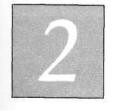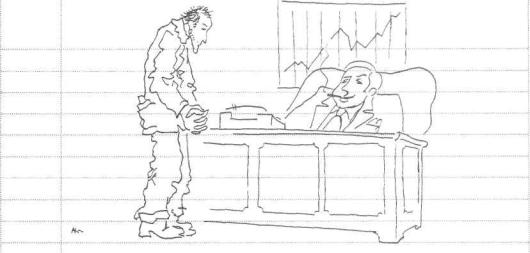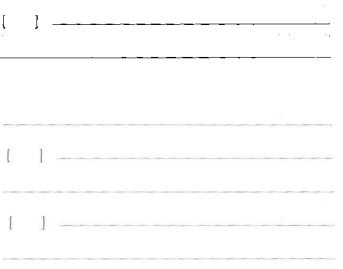

WORK

Work
INTRODUCTORY PASSAGE
Resume
Raymond A. Kroc
Santa Barbara, California
WORK EXPERIENCE
1955-Present |
Founder and Senior Chairman of the Board, McDonald's |
|
Corporation |
|
I m a d e a deal with the McDonald brothers in 1955. I |
|
wanted to use their name and the idea of their fast-food |
|
restaurant. I hoped to cash in on the need for good, |
|
inexpensive food served in a clean and pleasant atmos- |
|
phere. Ten years later, I bought them out and they signed |
|
over the company to me. I continued to build up the |
|
business. To control the quality, all managers had to |
|
attend classes at the Hamburger University, which I helped |
|
set up. By 1980, McDonald's had branched out so quickly |
|
that there were 6,000 restaurants throughout the world. |
|
The company was valued at $4.6 billion. Now that can |
|
probably be r o u n d e d off to $5 billion. |
1914-1955 |
Sales Manager, Lily Tulip Company |
|
I sold Multimixers, which stirred six milkshakes at the |
|
same time. This job brought me into contact with hun- |
|
dreds of restaurant owners. Once I arranged for a meeting |
|
with Maurice and Richard McDonald, who had a busy |
|
restaurant in California. I wanted to do business with |
|
them. The meeting paid off. We got down to business |
|
and entered into a deal that made history. |
|
Land Salesman, Florida |
|
As a salesman I had to convince people to invest in land in |
|
Florida. |
19

|
Jazz Pianist, Chicago, |
Illinois |
|
|
For a few years, I made a living by playing piano. As a |
||
|
nightclub entertainer, I learned to deal with all types of |
||
|
people. |
|
|
|
Ambulance Driver, Red Cross Ambulance Corps |
||
|
During World War I, |
I put in for a position as an am- |
|
|
bulance driver. |
|
|
EDUCATION |
Some high school |
|
|
HONORS |
American of the Year |
|
|
AND |
Golden Plate Award |
|
|
AWARDS |
Man of the Year |
|
|
PERSONAL |
Married; one child |
|
|
|
Born October 5, |
1902, in Chicago, Illinois |
|
|
Interests: piano, |
baseball |
|
Courtesy of the McDonald's Corporation, the fast-food chain.
IDIOMS AND |
THE POSITION |
|
|
OF THEIR OBJECTS |
GRAMMATICAL NOTES |
STYLE |
|
1. make |
[a deal] |
with |
|
2. cash in on |
informal |
|
buy |
o u t |
4. sign |
over |
5. build |
up |

Work 21
6. set [ |
up |
7.branch out
8. |
value |
|
at |
usually passive |
9. |
round |
1 off |
|
|
10. |
bring |
[ |
into |
[contact] with |
11.arrange for
12. |
do [business] with |
|
13. |
payoff |
informal |
|
||
14. |
get down to [business] |
|
15. enter into |
object is usually a noun |

22 Work
16.invest in
17. make [a living] by [ |
] |
|
object is usually the-ing form |
18.deal with
19.put in for
Use this page for one or more of the following exercises:
•Write the meaning of the idiom.
•Write sample sentences.
. Look for the idioms in short stories, novels, newspapers, or magazines, and copy the sentences containing them.
•Give examples of appropriate direct objects or objects of the preposition for each idiom that requires an object.
•Practice saying the idioms with correct stress. In general, verbs and particles are stressed, but prepositions are unstressed.
I.DEFINITIONS
DIRECTIONS: Mark the answer that is the closest synonym for the italicized idioms.
1.He made a deal with his client.
a. |
( |
) |
discussed it with |
b. |
( |
) |
agreed to do business with |
c. |
( |
) |
produced something with |
Work 23
Our competitor cashed in on the gas shortage.
a. |
( |
) |
requested cash for |
b. |
( |
) |
ordered more because of |
c. |
( |
) |
benefited from |
His partner bought him out.
a. |
( |
) |
paid him for his share in the |
|
|
|
business. |
b. |
( |
) |
bought some additional shares in |
|
|
|
the company. |
c. |
( |
) |
sold everything to him. |
She signed over the property to me.
a. |
( |
) |
put her signature on the paper to |
|
|
|
confirm the sale or change in |
|
|
|
ownership |
b. |
( |
) |
leased |
c. |
( |
) |
wrote her name above my name |
|
|
|
to show that she bought the |
|
|
|
property from me. |
In just two years the lawyer built up the firm.
a. |
( |
) |
developed |
b. |
( |
) |
constructed |
c.( ) renovated
The board of directors decided to set up a branch in Paris.
a. |
( |
) |
keep |
b. |
( |
) |
establish |
c. |
( |
) |
increase the size of |
The company branched out so fast that it went bankrupt.
a. |
( |
) |
opened one branch |
b. |
( |
) |
increased its prices |
c. |
( |
) |
expanded in a new direction |
8.The business was valued at half a million dollars.
a. |
( |
) |
considered to be worth |
b. |
( |
) |
as expensive as |
c. |
( |
) |
sold for |
9.She rounded off the total income to $7,500,000.
a. |
( |
) |
added |
b. |
( |
) |
subtracted |
c. |
( |
) |
changed the total to a round figure |
10.His job brought him into contact with a lot of artists.
a. |
( |
) |
helped him meet |
b. |
( |
) |
helped him send letters to |
c. |
( |
) |
helped him call |
11.Her secretary arranged for the conference.
a. |
( |
) |
attended |
b. |
( |
) |
was responsible for planning |
c. |
( |
) |
cancelled |
12.It was a pleasure to do business with that manufacturer.
a. |
( |
) |
hire |
b. |
( |
) |
work for the same company as |
c. |
( |
) |
trade with or negotiate with |
13. Her ingenious idea certainly paid off.
a. |
( |
) |
succeeded |
b. |
( |
) |
cost a lot of money |
c. |
( |
) |
was free |
14. After a few minutes of social talk, we got down to business.
a. |
( |
) |
sat down |
b. |
( |
) |
talked about our jobs |
c. |
( |
) |
began to talk seriously |

Work 25
15.After discussing the deal for two weeks, the companies finally entered into negotiations.
a. |
( |
) |
began |
b. |
( |
) |
finished |
c. |
( |
) |
considered |
16.He made a mistake when he invested in those stocks.
a. |
( |
) |
sold |
b. |
( |
) |
asked about |
c. |
( |
) |
bought and hoped to earn interest |
|
|
|
from |
17.It was impossible for him to make a living by acting.
a. |
( |
) |
support himself financially by |
b. |
( |
) |
live without |
c. |
( |
) |
have an interesting life by |
18.As a salesman, he had to deal with the public.
a. |
( |
) |
have contact with |
b. |
( |
) |
play cards with |
c. |
( |
) |
convince |
19.After working for the company for three months, he put in for a promotion.
a. |
( |
) |
rejected |
b. |
( |
) |
requested |
c. |
( |
) |
received |
II. WORD ASSOCIATION
DIRECTIONS: Two of the three choices below can be used with the idiom. Mark the two answers that can be used to complete each sentence correctly.
1.Mr. Williams finally made a deal with
a. |
( |
) |
that client |
b. |
( |
) |
his enemy |
c. |
( |
) |
the new product |

bought her out.
a. ( ) One of her partners
b.( ) The man who had 10096 of the stock
c.( ) A competitor
She signed over |
|
|
|
|
to me. |
||
|
|
|
|
|
|
|
|
|
a. |
( |
) |
the manager |
|||
|
b. |
( |
) |
her share of the company |
|||
|
c. |
( |
) |
the property |
|||
He is the only person who could build up |
|
||||||
|
a. |
( |
) |
the reputation |
|||
|
b. |
( |
) |
the president |
|||
|
c. |
( |
) |
the business |
|||
|
|
|
is branching out rapidly. |
||||
|
a. |
( |
) |
The enterprise |
|||
|
b. |
( |
) |
The office building |
|||
c.( ) The corporation
were valued at $ 100,000.
a. |
( |
,) |
The houses |
b. |
( |
) |
The estates |
c.( ) The dollars
Why don't you round off |
|
|
|
? |
||
a. |
( |
) |
the $50.00 |
|||
b. |
( |
) |
the figure |
|||
c. |
( |
) |
the price |
|||
I bet they are going to cash in on |
|
|||||
a. |
( |
) |
the shortage |
|||
b. |
( |
) |
the discovery |
|||
c. |
( |
) |
the dollars |
|||

Work 27
9.The president plans to set up
|
|
|
a. |
( |
) |
a new committee |
|
|
|
|
b. |
( |
) |
a central office |
|
|
|
|
c. |
( |
) |
an old library |
|
10. |
|
_ |
brought her into contact with many people. |
||||
|
|
|
a. |
( |
) |
Her job |
|
|
|
|
b. |
( |
) |
Her trip |
|
|
|
|
c. |
( |
) |
Her nervousness |
|
11. |
|
|
|
arranged for his trip. |
|||
|
|
|
|
|
|
|
|
|
|
|
a. |
( |
) |
His appointment |
|
|
|
|
b. |
( |
) |
His secretary |
|
|
|
|
c. |
( |
' ) |
The travel agent |
|
12.We hope to do business with that
|
a. |
( |
) |
product |
|
|
b. |
( |
) |
supplier |
|
|
c. |
( |
) |
manufacturer |
|
13. |
|
finally |
paid off. |
||
|
a. |
|
( |
) |
Her creative ideas |
|
b. |
( |
) |
Buying those lottery tickets |
|
|
c. |
( |
) |
The bill |
|
14.The two countries have decided to enter into
a. |
( |
) |
their old treaty |
|
|
b. |
( |
) |
negotiations |
|
|
c. |
( |
) |
a period of peace |
|
|
15. They have invested all their money in |
|
. |
|||
a. |
( |
) |
a Ferrari |
|
|
b. |
( |
) |
a stereo |
|
|
c. |
( |
) |
lunch |
|
|

28 Work
16. |
Because of his position, he has to deal with a lot of |
|
r. |
||||||
|
|
a. |
( |
) |
business |
|
|||
|
|
b. |
( |
) |
wholesalers |
|
|||
|
|
c. |
( |
) |
companies |
|
|||
17. |
|
|
got down to business within ten minutes. |
||||||
|
|
|
|
|
|
The |
executives |
|
|
|
|
a. |
( |
) |
|
||||
|
|
b. |
( |
) |
The |
children |
|
||
|
|
c. |
( |
) |
The lawyer and his client |
|
|||
18.She has already put: in for
a. |
( |
) |
a |
leave of absence |
b. |
( |
) |
a |
raise |
c. |
( |
) |
an application |
|
19.It isn't easy to make; a livingg: hvby
a. |
( |
) |
studying |
b. |
( |
) |
working part-time |
c. |
( |
) |
selling magazines |
III. THE POSITION OF THE OBJECT
DIRECTIONS: Fill in one of the blanks (a or b) in each sentence with the object given in parentheses. Two of the sentences do not have objects. For those sentences, do not write anything.
1. |
You should round |
|
off |
|
to the nearest |
|||||||||||
|
|
|
|
|
a |
|
|
b |
|
|||||||
|
whole number, (it) |
|
|
|
|
|
|
|
|
|
|
|
|
|||
2. |
He is going to cash in |
|
|
|
on |
|
|
|
(it) |
|||||||
|
|
|
|
|
a |
|
|
b |
|
|||||||
3. |
It isn't easy to deal |
|
with |
|
|
(them) |
||||||||||
|
|
|
|
|
a |
|
|
b |
|
|||||||
4. |
She has already put in |
|
|
|
for |
|
|
|
|
(it) |
||||||
|
|
|
|
|
|
|
|
|
|
|
|
|
|
|
|
|
Work |
29 |
5. |
It's hard to make a living |
|
|
|
|
by |
|
|
|
|
|
|
|
|
|
|
|
||||||||||||||||||||||
|
|
|
|
|
|
|
|
|
|
|
|
|
|
|
a |
|
|
|
|
|
|
|
|
|
|
|
|
b |
|
|
|
|
|
|
|||||
|
(acting) |
|
|
|
|
|
|
|
|
|
|
|
|
|
|
|
|
|
|
|
|
|
|
|
|
|
|
|
|
|
|
|
|
|
|
|
|
||
6. |
His |
position |
b r o u g h t |
into |
|
|
|
|
|
contact |
|||||||||||||||||||||||||||||
|
|
|
|
|
|
|
|
|
|
|
|
|
a |
|
|
|
|
|
|
|
|
|
|
|
|
b |
|
|
|
|
|
|
|||||||
|
with them, |
(him) |
|
|
|
|
|
|
|
|
|
|
|
|
|
|
|
|
|
|
|
|
|
|
|
||||||||||||||
7. |
He |
has arranged |
|
|
|
|
|
|
|
|
|
for |
|
|
|
|
|
|
|
b |
• (it) |
|
|
|
|
|
|
||||||||||||
|
|
|
|
|
|
|
|
a |
|
|
|
|
|
|
|
|
|
|
|
|
|
|
|
|
|
|
|||||||||||||
8. |
You |
should |
have b o u g h t |
|
|
|
|
o u t |
|
|
b |
|
|
|
|
|
(him) |
||||||||||||||||||||||
|
|
|
|
|
|
|
|
|
|
|
|
|
|
|
a |
|
|
|
|
|
|
|
|
|
|
|
|
|
|
|
|
|
|
|
|
||||
9. |
W h e n everyone |
arrived we g o t d o w n |
|
|
|
to |
|
|
|
|
|
|
|||||||||||||||||||||||||||
|
|
|
|
|
(business) |
|
|
|
|
|
|
|
|
|
|
|
|
|
|
|
|
|
|
|
|
|
|
|
|
||||||||||
10. |
The necklace was valued |
|
|
at |
. |
($10,000) |
|||||||||||||||||||||||||||||||||
|
|
|
|
|
|
|
|
|
|
|
|
|
|
a |
|
|
|
|
|
|
|
|
|
|
|
|
b |
|
|
|
|
|
|
|
|||||
11. |
They built |
|
|
|
|
|
|
|
up |
|
|
|
|
|
|
|
|
|
|
(it) |
|
|
|
|
|
|
|||||||||||||
|
|
|
|
|
|
a |
|
|
b |
|
|
|
|
|
|
|
|
|
|
|
|
||||||||||||||||||
12. |
You should do business |
|
|
with |
|
|
|
|
|
|
|
|
|
|
(them) |
||||||||||||||||||||||||
|
|
|
|
|
|
|
|
|
|
|
|
|
|
a |
|
|
|
|
|
|
|
|
|
|
|
|
|
b |
|
|
|
|
|
|
|||||
13. |
His idea didn't really pay |
|
|
|
|
|
|
off |
|
b |
|
|
|
|
|
|
|||||||||||||||||||||||
|
|
|
|
|
|
|
|
|
|
|
|
|
|
|
a |
|
|
|
|
|
|
|
|
|
|
|
|
|
|
|
|
|
|
|
|||||
14. |
They entered |
|
|
|
|
|
|
|
|
|
into |
|
|
|
|
|
|
|
|
|
|
|
too quickly, (it) |
||||||||||||||||
|
|
|
|
|
|
a |
|
|
|
|
b |
|
|
|
|
|
|
|
|
|
|
|
|
||||||||||||||||
15. |
The company has branched |
|
|
|
|
|
|
|
|
|
out |
_ |
|
|
b |
|
|
|
|
|
|
||||||||||||||||||
16. |
He didn't want to sign |
|
|
over |
|
|
|
|
|
|
|
(it) |
|||||||||||||||||||||||||||
|
|
|
|
|
|
|
|
|
|||||||||||||||||||||||||||||||
|
|
|
|
|
|
|
|
|
|
|
|
|
a |
|
|
|
|
|
|
|
|
|
|
|
|
b |
|
|
|
|
|
|
|||||||
17. |
We want to make a deal |
|
|
with |
. |
|
|
|
|
|
|
(them) |
|||||||||||||||||||||||||||
|
|
|
|
|
|
|
|
|
|
|
|
|
|
|
|
|
|
|
|
|
|
|
|
|
|
|
|
|
|
|
|
|
|
|
|
|
|
||
|
|
|
|
|
|
|
|
|
|
|
|
|
a |
|
|
|
|
|
|
|
|
|
|
|
|
|
b |
|
|
|
|
|
|
||||||
18. |
He forgot to set |
|
|
|
|
|
|
|
|
up |
|
|
|
|
|
|
|
|
|
|
|
|
|
|
|
(it) |
|
|
|
|
|
|
|||||||
|
|
|
|
|
|
|
a |
|
|
|
|
|
|
|
|
b |
|
|
|
|
|
|
|
|
|
|
|
||||||||||||
19. |
We are happy we invested |
|
|
|
in |
|
|
|
|
|
|
|
(it) |
||||||||||||||||||||||||||
|
|
|
|
|
|
|
|
|
|
|
|
|
|
|
|
|
|
|
|
|
|
|
|
|
|
|
|
|
|
|
|
|
|
|
|
|
|
|
|

30 Work
IV. LISTENING C O M P R E H E N S I O N A N S W E R S H E E T
DIRECTIONS: You will hear a situation presented in one or two sentences. Listen to each statement and mark the response that most closely corresponds to the situation.
1. |
a. |
She had to find a |
hotel herself. |
|
b. |
The airline found |
a hotel for her. |
|
c. |
The airline cancelled the flight because of the hotel. |
|
a.The U.S. is a self-sufficient country.
b.The U.S. trades with only European countries.
c.The U.S. buys products from these countries and also sells products to them.
3.a. They talked too much and didn't do any work.
b.They gossiped for a while and then began to work seriously.
They did business with their friends.
a.Carnegie built many foundations with steel.
b.Carnegie used his money to establish several foundations.
Carnegie was a researcher.
5. a. |
He is unemployed now. |
b.He wants another job or more money at his present job.
c.He got a raise.
6.a. The painting was sold for less than it was worth.
b.The painting was worth $100,000.
c.The painting was sold for $250,000.
7.a. He plays for free.
b.He plays tennis for exercise.
c.He is probably a professional tennis player.

Work 31
8.a. He sold the entire company.
b. He sold his share of the company.
c.He asked his partner to lend him some cash.
9.a. The countries did business for five years.
b.In five years they will trade with each other.
c.They recently agreed to trade with each other.
10.a. The Standard Oil Company became so large that it was a monopoly.
b.Rockefeller kept the company small.
c.Rockefeller's company was average.
11.a. Finally, the applicant got less money.
b.Finally, the applicant got more money.
c.The proposed salary stayed the same.
12.a. The grandson received everything before the grandfather died.
b.He left his grandson everything in his will.
c.The grandfather signed everything he owned.
13.a. He worked with angry people in his office.
b.He was angry all the time.
c.He had to listen to complaints.
14.a. The strike wasn't settled.
b.The strike lasted two weeks.
c.The management gave the workers two-weeks' salary.
15.a. In 1970 the U.S. population was exactly 203,000,000.
b.In 1970 the U.S. population was about 203,000,000.
c.The U.S. population in 1917 was exactly 203,211,926.

32 Work
16.a. His gadget wasn't successful.
b.It was a good investment.
c.He saved his money instead of investing it.
17.a. The Teamsters Union joined the largest labor union in the U.S.
b.The Teamsters Union took him to see the largest union in the U.S.
c.He met a lot of truck drivers through the Teamsters Union.
a.They thought about selling American products in Japan.
b. |
They got rich by selling American products in Japan. |
c.The Japanese didn't want to buy American products.
19.a. The U.S. became independent in 1789.
b.The new government was established in 1789.
c.George Washington became president in 1776.
20.a. Vanderbilt had only one business, shipping.
b.Vanderbilt had only one business, railroads.
c.After starting in the shipping business, Vanderbilt went in a new direction.
V . F I L L IN
DIRECTIONS: Fill in the blanks with the correct preposition or particle.
Ray Kroc had many jobs before he started his billion dollar business
called the McDonald's Corporation. During World War I, he had
put in.  a position as an ambulance driver and got it. After
a position as an ambulance driver and got it. After
that, he made a living. .playing piano in nightclubs in
Chicago. Then he worked as a salesman in Florida. His job was to

Work |
33 |
convince people to invest |
|
land in |
Florida. The next posi- |
||||
|
3 |
|
|
|
|
|
|
tion he took brought him |
contact |
|
hundreds of |
||||
|
4 |
|
|
|
5 |
|
|
restaurant owners. He sold a gadget called a Multimixer, which could
mix six milkshakes at the same time. This is how he met the McDonald
brothers. They wanted to buy eight Multimixers for their busy restau-
rant. Mr. Kroc decided to arrange |
|
|
|
|
a meeting with them. He |
|||||||||
|
|
|
|
|
|
6 |
|
|
|
|
|
|
|
|
was very interested in doing business |
|
|
the |
McDonald |
||||||||||
brothers. They met and got |
|
|
to business quickly. The meet- |
|||||||||||
|
|
|
|
8 |
|
|
|
|
|
|
|
|
|
|
ing paid |
The McDonalds and Ray Kroc entered |
|
|
|||||||||||
& r |
|
9 |
|
|
|
|
|
|
|
|
|
|
10 |
|
a deal that made history. |
|
|
|
|
|
|
|
|
|
|||||
|
Mr. Kroc was |
sure he could |
cash |
|
|
|
|
the |
||||||
|
|
|
|
|
|
|
|
|
|
11 |
|
|
12 |
|
need for good, inexpensive food served in a clean and pleasant atmos-
phere. Ten years after he had made a deal |
|
the McDonalds, |
||||||||||
|
|
|
|
|
|
|
|
|
|
|
|
|
he bought them |
They signed |
13 |
|
the business to |
||||||||
|
|
|||||||||||
|
14 |
|
|
|
|
|
|
15 |
|
|
||
him. Mr. Kroc built |
|
|
the company and helped it branch |
|||||||||
|
He even set |
|
|
|
Hamburger University, where |
|||||||
17 |
|
|
|
|
18 |
|
|
|
|
|
|
|
the managers were trained. |
|
|
|
|
|
|
|
|
||||
Ray Kroc had been working over forty years before starting the
McDonald's Corporation. During these years he had to deal
all types of people. But Ray Kroc was a good businessman, and without
even a high school education, he founded a company that was

34 Work
valued |
|
$4.6 billion by 1980. N o w that can probably be |
|||
|
|
|
20 |
|
|
r o u n d e d |
|
|
to $5 billion. |
||
|
|
|
21 |
|
|
VI. PRACTICAL APPLICATION
DIRECTIONS: Read the sentences below about Henry Ford; then rewrite each sentence using the idioms given.
1.Henry Ford's parents were Irish immigrants who lived on a farm in Michigan.
2.Ford worked in a machinist's shop when he was fifteen years old. That is where he learned about machines and engines.
3.He and some friends formed the Detroit Automobile Company which built custom cars for very rich people.
4.Ford left the company to build racing cars.
5.In 1903 he .and several partners formed the Ford Motor Company. They produced the Model T five years later.
6.Soon the Model T was being produced on an assembly line. The company grew and Ford became famous for his assembly-line method of production.
7.Although Ford was against unions, in 1941 he signed a contract with the United Auto Workers union.
8.Gradually, Ford bought stock from other stockholders and gained complete control of the Ford Motor Company, which was worth billions.
build up |
pay off |
b r a n c h out |
|
b u y out |
m a k e a living by |
do |
business with |
deal with |
get d o w n to business |
set |
up |
value at |
arrange for |
m a k e a deal with |
|
sign over |
|
|
|

Work 35
VII. ADDITIONAL EXERCISES
1.Make up a story about the picture at the beginning of the chapter. Use as many idioms as possible. This exercise can be written or oral.
2.Ask each other questions about the picture. You must use an idiom in your response.
3.Use the lines below the picture for a dictation exercise. The teacher
or a student dictates the introductory passage and the students write it.
4. Rewrite the introductory passage in the future tense.
